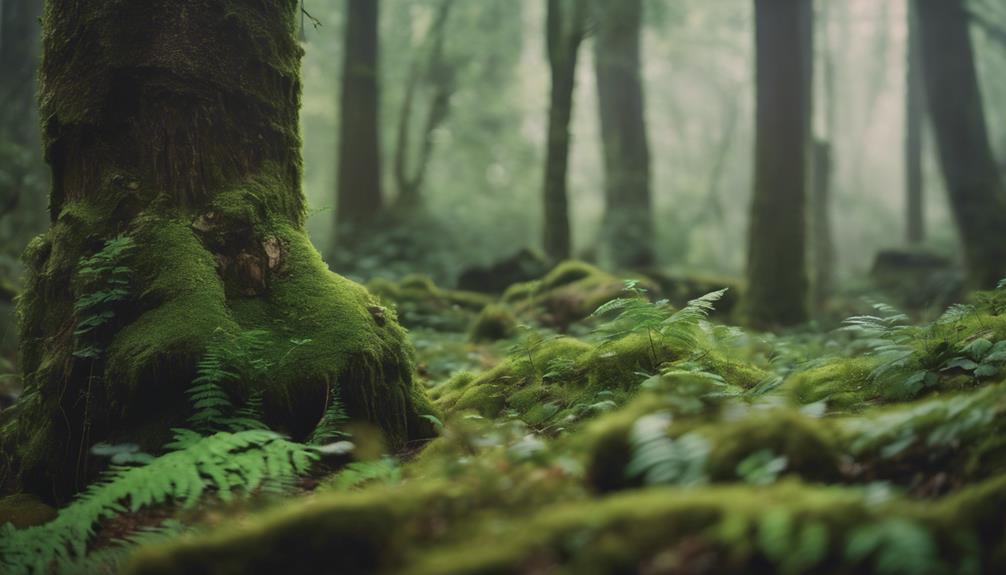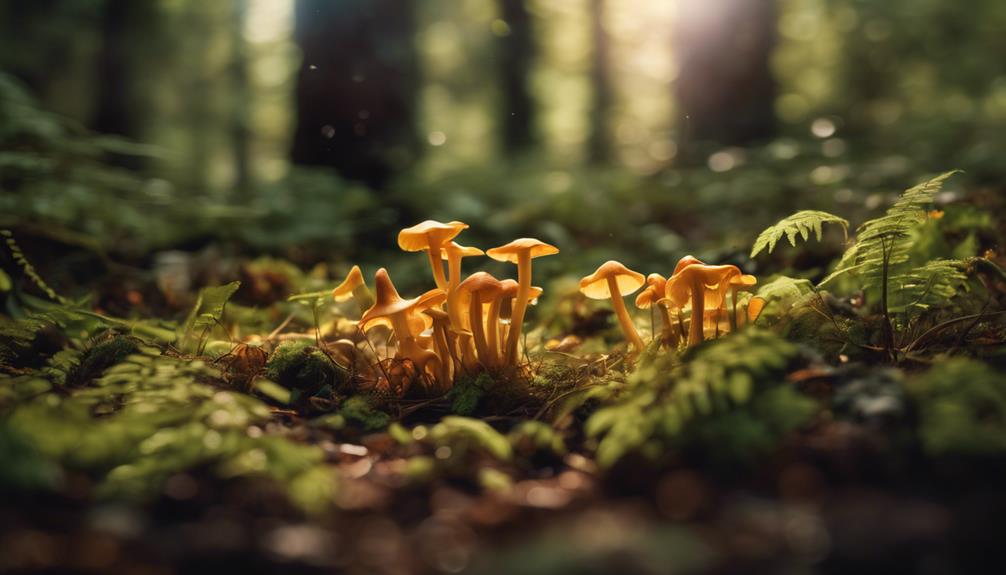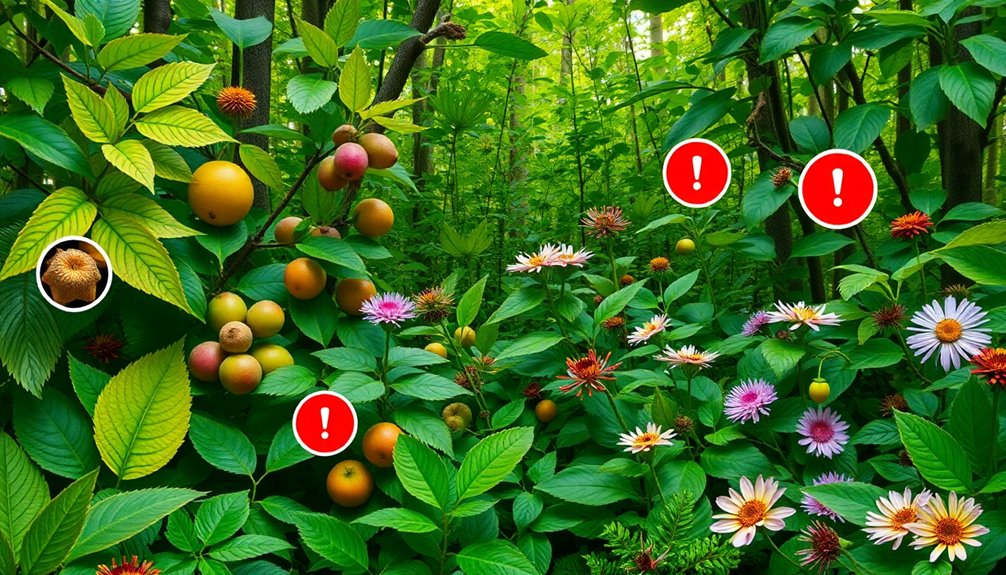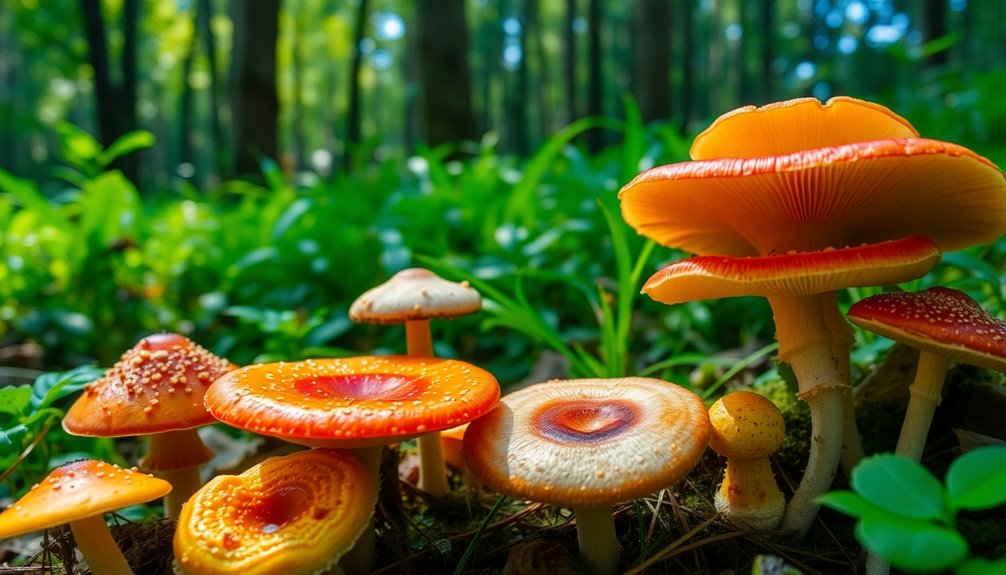You're legally allowed to forage for moss in the UK for personal consumption, but you must do so in compliance with various laws and regulations. These laws, including the Theft Act and the Wildlife and Countryside Act, aim to protect the environment and private property. You'll need permission from landowners before collecting moss, especially for commercial purposes. Certain areas, like national parks, forests, and nature reserves, are legal foraging sites, but you'll still need to comply with local regulations. By understanding these laws and regulations, you can forage for moss responsibly and avoid legal issues. Explore further to discover the intricacies of foraging moss in the UK.
Key Takeaways
- Foraging moss for personal consumption is legal in the UK under the Theft Act (1968), but permission is required for commercial purposes.
- Uprooting wild plants without permission is prohibited under the Wildlife and Countryside Act (1981), and can be considered theft.
- Permission from the landowner is necessary before collecting moss, especially for commercial purposes, to avoid criminal offenses.
- Local bylaws and site-specific regulations may restrict or prohibit moss foraging in certain areas, including national parks and nature reserves.
- Prior permission from landowners and compliance with UK laws and regulations are essential for legal and responsible moss foraging.
Understanding UK Foraging Laws
When foraging for moss in the UK, you need to understand the laws that govern this activity to avoid getting into trouble. The good news is that foraging moss for personal consumption is legal under the Theft Act (1968).
However, uprooting wild plants without permission is prohibited under the Wildlife and Countryside Act (1981). This means you need permission from the landowner before collecting moss, especially if you're planning to use it for commercial purposes. Commercial foraging without permission is considered theft and a criminal offense.
Additionally, local bylaws may restrict foraging activities, including moss collection, in certain areas. It's important to check with local authorities before heading out to forage.
Legal Foraging Sites and Restrictions

Across the UK, you'll find numerous legal foraging sites, including national parks, forests, and nature reserves, where moss can be collected with permission or under specific guidelines. It is important to always adhere to local foraging rules on crown land, as these areas may have additional restrictions in place to protect the ecosystem. Permission is often required, especially when gathering plants like moss, to ensure sustainable practices are followed. By respecting these guidelines, foragers can contribute to the conservation of delicate habitats across the UK.
However, it's essential to understand that not all sites are legally allowed for moss foraging. You'll need to obtain permission from the landowner or local authorities before you can forage on private land.
In some cases, you might be legally allowed to forage in certain areas, but you'll still need to comply with local regulations and guidelines.
Private Land and Access Rights

You'll need to secure explicit permission from landowners before foraging for moss on private land in the UK, as access rights vary and can be restricted. This is vital to guarantee you're not trespassing or stealing, which can lead to legal consequences.
The Countryside and Rights of Way Act (CROW) 2000 grants limited access to certain privately owned land for recreational activities, but foraging may not be included. Even if you're on a public footpath or designated open land under the CROW Act, local bylaws could still prohibit foraging.
It's crucial to respect private property rights and seek permission from landowners before foraging moss. This permission can help you avoid any potential disputes or legal issues. Always prioritize getting explicit permission to make sure you're foraging moss legally and respectfully.
Don't assume you have access to private land, as this can lead to trouble. Instead, take the time to seek permission and enjoy foraging moss in the UK with peace of mind.
Protected Areas and Endangered Species

As you venture out to forage for moss in the UK, it's crucial to be aware of protected areas and endangered species.
You'll want to understand how national park restrictions and SSSI designations impact your foraging activities, as well as the measures in place to safeguard rare species.
National Park Restrictions
What restrictions will you encounter when foraging for moss in UK national parks, and how do these protected areas safeguard endangered species?
In the UK, national parks have restrictions in place to preserve biodiversity and protect endangered species. When it comes to foraging moss, you'll generally find that it's prohibited in these protected areas. This is because foraging activities can disturb the delicate ecosystem and vulnerable flora and fauna.
National parks are designated to safeguard endangered species from disturbance, including foraging. It's vital to respect these restrictions to maintain the ecological balance and protect sensitive species. If you're planning to forage moss in a national park, be sure to check with local authorities or park regulations beforehand. Failure to do so can result in legal repercussions.
SSSI Designations Matter
When foraging for moss, it's vital to recognize that Sites of Special Scientific Interest (SSSIs) designate areas of significant scientific importance, where rare or endangered species of flora and fauna call home. These areas are protected because they provide essential habitats for biodiversity conservation and ecosystem health.
As you plan your foraging activities, you need to be mindful that SSSIs have strict regulations in place to safeguard these sensitive ecosystems. Removing or disturbing endangered species, including moss, is illegal and can lead to legal consequences, fines, and damage to critical habitats.
You must make sure that your foraging activities don't harm these protected areas, as the consequences can be severe. Before heading out, research the areas you plan to visit and verify if they're designated as SSSIs. By doing so, you can enjoy foraging for moss while respecting the importance of preserving these unique areas of Special Scientific Interest.
Rare Species Protection
You'll need to be aware that many rare moss species in the UK are safeguarded in protected areas, where conservation efforts focus on preventing their decline. These protected areas provide a safe haven for rare moss species to thrive, and conservation efforts are in place to guarantee their survival.
| Protected Areas | Conservation Efforts | Goals |
|---|---|---|
| Designated Reserves | Habitat Restoration | Prevent Decline |
| Protected Habitats | Legal Protection | Guarantee Survival |
| Wildlife Reserves | Monitoring & Research | Track Population Trends |
In these protected areas, rare moss species are conserved and managed to prevent over-collection and habitat destruction. Conservation efforts aim to restore habitats and provide legal protection to guarantee the survival of these rare species. Monitoring and research are also essential in tracking population trends and understanding the effectiveness of conservation efforts. By safeguarding these rare moss species, we can work towards preserving the UK's unique biodiversity.
Commercial Foraging and Regulations

As you venture into commercial foraging, it's vital to understand the regulations that govern this industry.
You'll need to secure the necessary permits and licenses, as well as obtain landowner permissions, to avoid legal repercussions.
Permits and Licenses
To guarantee sustainable foraging practices, it's crucial to obtain the necessary permits and licenses if you plan to commercially forage moss in the UK. Unauthorized commercial moss collecting is regarded as theft and a criminal offense, so obtaining explicit permission is vital.
Remember, while foraging wild mushrooms or moss for personal consumption is generally acceptable under the Theft Act (1968) for non-commercial purposes, commercial foraging requires permission. You must be an authorized person to pick moss on private or protected lands. Failure to comply with these regulations will result in legal consequences.
The Wildlife and Countryside Act (1981) safeguards listed moss species from intentional uprooting or destruction, with specific laws prohibiting unauthorized commercial harvesting of moss species. It's important not to take the risk of getting caught; instead, make sure to seek the necessary permits and licenses for commercial moss foraging.
Respecting the land and its owners by obtaining explicit consent before foraging is crucial to avoid legal issues and uphold sustainable foraging practices.
Landowner Permissions
Before you start commercial moss foraging, obtain explicit permission from the landowner, as they have the right to restrict or prohibit foraging on their private property. In the UK, commercial foraging without consent is considered theft and is a criminal offense under the Theft Act and Wildlife and Countryside Act. Landowners have the authority to regulate or ban foraging on their land, especially for commercial gain.
| Regulation | Applicable Law | Consequence |
|---|---|---|
| Commercial foraging without consent | Theft Act | Criminal offense |
| Foraging on private property | Wildlife and Countryside Act | Restriction or prohibition |
| Landowner permission | UK laws and regulations | Compliance and legality |
| Private property rights | UK laws and regulations | Restriction or prohibition |
| Foraging for commercial gain | Theft Act and Wildlife and Countryside Act | Criminal offense and restriction |
Essential Foraging Safety and Etiquette

When foraging for moss in the UK, you must prioritize safety and etiquette to guarantee a responsible and sustainable harvest. As you venture out to picks wild plants and mushrooms, remember to obtain permission before collecting wild moss on private or protected lands. This secures you're adhering to legal regulations and respecting landowners' rights.
Always carry a field guide to identify edible moss species accurately, ensuring you're gathering the right type. Practice sustainable foraging by only taking a small amount of moss, leaving the majority to support the ecosystem.
Respect the environment by avoiding damaging habitats or disrupting wildlife while foraging. Follow ethical guidelines by not over-foraging moss and considering the long-term impact on the ecosystem. By doing so, you'll contribute to preserving the UK's natural beauty for future generations.
Frequently Asked Questions
Is It Illegal to Collect Moss in the Uk?
You're wondering if it's illegal to collect moss in the UK – the short answer is, it's not, as long as you do it responsibly and sustainably, and obtain permission on private land.
What Are the Rules for Foraging in the Uk?
You're wondering about the rules for foraging in the UK? Generally, you can forage wild edibles for personal use, but uprooting plants without permission is a no-go, and commercial foraging is theft.
How Do You Harvest Moss Uk?
As you venture into the wild, you're itching to know the secrets of harvesting moss in the UK. You'll need to wield scissors or a small knife to carefully snip patches, ensuring minimal environmental disturbance, and avoid over-harvesting to preserve nature's balance.
Can You Have a Moss Lawn in the Uk?
You can have a moss lawn in the UK, and it's a great option for shaded, damp areas where grass struggles. With minimal maintenance, you'll enjoy a lush, green alternative to traditional lawns.
Can You Take Moss From the Woods?
You're wondering if you can take moss from the woods, but be aware that doing so without permission might be considered theft, so obtaining landowner approval before collecting moss from the wild is crucial.
Conclusion
As you venture into the UK's lush landscapes, remember that foraging moss is a delicate dance between nature and responsibility.
Like a gentle rain nourishing the earth, your actions can either harm or harmonize with the environment.
By respecting the land, laws, and creatures, you'll find that foraging moss can be a symbiotic relationship, where both you and nature thrive.










